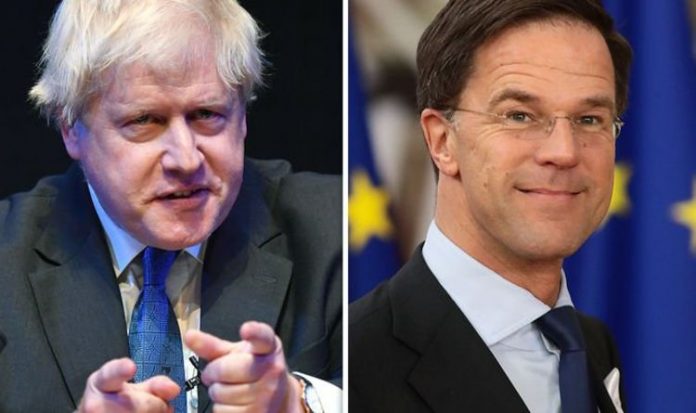Fishing has been a contentious point in Brexit talks, with the UK highly critical of the EU’s longstanding Common Fisheries Policy (CFP), which allows member states to fish in each others’ waters based on a quota system set by the bloc. The EU’s own mandate for trade talks says the UK and Brussels should fix a long-term deal on access to each others’ waters in exchange for a Free Trade Agreement (FTA), but the UK is pressing for annual talks to set those quotas – with the ability to block EU vessels if those discussions break down. France is one of many nations dependent on British fishing grounds and before the negotiations even started, it was Emmanuel Macron’s government who made it clear to the EU’s chief negotiator Michel Barnier that he had to push for stronger commitments on regulatory alignments in return for maintaining free trade.
Seven months later and with less than two weeks until the transition period comes to an end, an agreement still appears far away.
As many Brexiteers wonder whether a no deal scenario could be the only way to get back control of British waters, a 2018 investigation reveals that even if there is no agreement struck between the EU and Britain, the majority of UK fishing rights will remain in the hands of a small domestic elite and a handful of foreign multinationals.
The Fisheries Act published in 2018, which sets the legal foundations for the UK’s fishing industry after Brexit, does not see any redistribution of Britain’s existing quota rights.
The investigation published by Unearthed reads: “More than two-thirds of the UK’s fishing quota is controlled by just 25 businesses – and more than half of those are linked to one of the biggest criminal overfishing scams ever to reach the British courts.
“Meanwhile, in England nearly 80 percent of fishing quota is held by foreign owners or domestic Rich List families, and more than half of Northern Ireland’s quota is hoarded onto a single trawler.”
Half of England’s quota is held on Dutch, Spanish, or Icelandic-owned “flagships”, so called because they sail under a British flag.
One Dutch multinational alone controls around a quarter of English quota, the investigation found.
By comparison, the UK’s small scale, “inshore” vessels must fish from a pool of quota amounting to less than two percent, despite making up around 79 percent of the UK fishing fleet.
JUST IN: English language dubbed ‘on way out’ by Brussels
Responding to Unearthed’s findings at the time, former Shadow Environment Secretary Sue Hayman said that ministers needed to take “urgent action to use the powers that they have domestically to redistribute fishing quota to deliver a fairer deal for smaller boats”.
She continued: “Fishing was the poster child of the Leave campaign and Michael Gove has already broken promises he made to the industry to secure full control of our waters during the transition.
“With all the talk of ‘take back control’, ministers have the power to distribute UK quota now and put the smaller-scale fleet first. So why wasn’t it mentioned in their white paper?
“This investigation shows that, while it points the finger at others, this government is to blame for a sector rigged in the interests of the super-rich.
“Any future fishing policy must consider how new and existing quota can be more fairly distributed and we will treat this as a priority in the upcoming Fisheries Bill.”
DON’T MISS:
David Frost pushed for agreement that led to today’s deadlock [INSIGHT]
Boris Johnson to ‘miss 2021 deadline for US-UK trade deal’ [EXCLUSIVE]
Sneering EU mocked beans on toast before scallops menu move [REVEALED]
One of the priorities of the Fisheries Act, which became law on November 21, is that “fishing activities of UK fishing boats bring social or economic benefits to the United Kingdom”.
Current rules say even if vessels are 100 percent foreign-owned, they must have an “economic link” to the UK.
That means they must meet one of five conditions, which include landing more than half their catch at UK ports or having majority British crews.
A consultation by the Department for Environment and Rural Affairs (Defra), which closed in November, outlined plans to “increase the landing requirements from 50 percent to 70 percent for quota catch caught by English registered vessels landing more than two tonnes per annum”.
The consultation stated that this change “could result in up to £60million worth of additional landings each year”, but it did not mention any changes to rules around ownership.
A Defra spokesperson told Express.co.uk: “As an independent coastal State we’re committed to ensuring a fairer share of fishing opportunities, and while we will provide certainty and stability to the industry by managing existing quota with the current method – we are currently exploring alternative methods for allocating and managing additional quota.
“Commercial fishing vessels must demonstrate a genuine link with the UK economy to fish in our waters, ensuring local communities benefit from the fishing activities of UK-registered vessels.”
For many in the fishing industry, though, Defra’s proposals are not good enough.
Paul Lines, from Fishing for Leave, a pro-Brexit group within the British fishing industry, recently told BBC: “If the Government allows foreign companies to continue to own more than half of England’s quota, it would be a calamity.”







